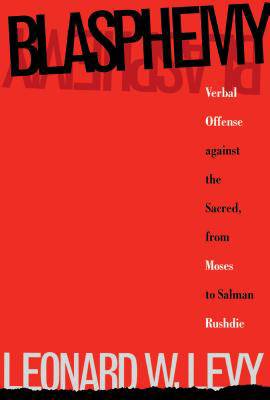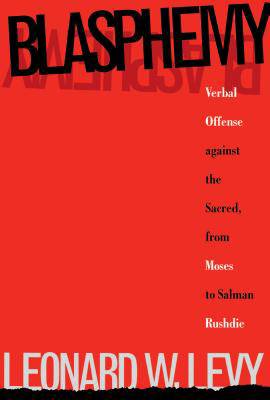
- Afhalen na 1 uur in een winkel met voorraad
- Gratis thuislevering in België vanaf € 30
- Ruim aanbod met 7 miljoen producten
- Afhalen na 1 uur in een winkel met voorraad
- Gratis thuislevering in België vanaf € 30
- Ruim aanbod met 7 miljoen producten
Blasphemy
Verbal Offense Against the Sacred, From Moses to Salman Rushdie
Leonard W LevyOmschrijving
Socrates, Jesus, Renaissance philosopher Giordano Bruno, Quakers George Fox and William Penn, Daniel Defoe and Thomas Paine were all condemned for blasphemy. In a tour de force of lively writing and keen historical interpretation, prolific legal historian Levy shows that the charge of blasphemy has served as a means to besmirch opinions or people held objectionable to those in positions of authority. For centuries the Catholic Church persecuted blasphemers and heretics for their divergent views. Protestant reformers adopted the epithet "blasphemer" to castigate dissidents within their own ranks. Proceeding from fifth century B.C. Athens to medieval persecution of the Jews to the "hysteria" over Salman Rushdie's The Satanic Verses, this work is both an essential casebook and an outspoken, feisty, important study of the struggle for intellectual and religious liberties.
Leonard Levy traces the varied meanings of blasphemy throughout Western law. He argues that while past sanctions against the crime have inhibited all manner of cultural, political, scientific, and literary expression, we also pay a price for our extraordinary expansion of the scope of permissible speech. We have become, he charges, not only a free society but one that is 'numb' to outrage.
Specificaties
Betrokkenen
- Auteur(s):
- Uitgeverij:
Inhoud
- Aantal bladzijden:
- 704
- Taal:
- Engels
Eigenschappen
- Productcode (EAN):
- 9780807845158
- Verschijningsdatum:
- 20/02/1995
- Uitvoering:
- Paperback
- Formaat:
- Trade paperback (VS)
- Afmetingen:
- 156 mm x 235 mm
- Gewicht:
- 1029 g

Alleen bij Standaard Boekhandel
Beoordelingen
We publiceren alleen reviews die voldoen aan de voorwaarden voor reviews. Bekijk onze voorwaarden voor reviews.








